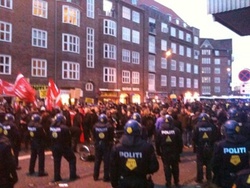Hundreds arrested at Copenhagen protest rally
COP15 Demonstrators attend protest march in central Copenhagen
Hundreds of people were arrested in Copenhagen today after violence erupted during a major protest march through the Danish capital as UN climate change talks reached their halfway point.
The demonstration, organised to urge conference delegates to work out a binding deal to tackle climate change, was largely peaceful but was marred when a group of protesters threw bricks at police.

As many as 700 people are thought to have been arrested amid clashes with riot police as the authorities used "kettling" tactics to contain marchers.
Organisers estimated that up to 100,000 protesters, including some dressed as penguins and polar bears and carrying signs saying "Save the Humans", joined the march across the city to the conference centre where negotiators and ministers are meeting.
A British demonstrator, Georgy Forshall, told the Observer: "Two of my friends are in there. The police said demonstrators had been throwing stones, but my friends were in a cow costume, they wouldn't have been able, physically, to throw stones."
The Danish police, who put the number of those taking part in the march at 30,000, said two Britons involved in the protest had been deported.
Police spokesman Henrik Moeller Jakobsen said the arrests were made because of stone-throwing. "The activists also wear masks on their faces and this is illegal under Danish law," he said.
The UN-sponsored summit is meanwhile entering its final phase with more than 100 world leaders, including Barack Obama, Gordon Brown and Chinese premier Wen Jiabao, arriving to hammer out a deal.
So far the conference has been characterised by posturing and recriminations but gained some focus on Friday with the release of a document outlining ambitious greenhouse gas reductions over the next 40 years.
Industrialised nations will shoulder most of the burden of emission cuts in the near term, it is proposed. Collectively, they will reduce their output of greenhouse gases by between 25% and 45% by 2020 compared with 1990 levels. During that time, major developing countries would reduce theirs by between 15% and 30%. Together, all countries would cut emissions between 50% and 95% by 2050.
However, the text fails to indicate how much money rich countries would give poor ones to cope with global warming, a major bone of contention. The European Union has pledged to provide $3.6bn a year over the next three years to help poorer countries adapt to the impact of climate change: from coping with flood and drought to avoiding deforestation. This figure was dismissed as inadequate by delegates from small island states and the nations from the least developed countries bloc.
Island states – such as the Maldives, the Seychelles and Tuvalu – are the most vulnerable to sea-level rises, a consequence of melting ice caps, and are particularly concerned about the need for firm, predictable funding to help them adapt. They want any final treaty agreed at Copenhagen to set a target year, within the next decade, when emissions peak and then begin to fall. This concept is absent from the draft.
Source: http://www.guardian.co.uk/environment/2009/dec/12/hundreds-arrested-copenhagen-protest-rally



